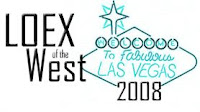After getting back yesterday from LOEX in Chicago, my attention is now turned to LOEX of West. The conference theme is:  Successful Experimentation and Innovation in Instruction. I am excited about this conference because gaming was one of the focuses within the theme. Sara and I are presented an updated version of our LOEX presentation. There are a number exciting presentations focusing on gaming, but my concern is that they are all focused on one of the two days.
Successful Experimentation and Innovation in Instruction. I am excited about this conference because gaming was one of the focuses within the theme. Sara and I are presented an updated version of our LOEX presentation. There are a number exciting presentations focusing on gaming, but my concern is that they are all focused on one of the two days.
Friday, June 6th
Chris Thomas and Jerremie Clyde from the University of Calgary are talking about their Half-Life 2 mod for information literacy. More info on their project can be found on their site, Hardplay.
Bee Gallegos from Arizona State University is presenting during the second session of the day on their information literacy game project Quarantined.
This is great and exciting news for information literacy and video games in academic libraries. The problem comes during the final session where 3 of the 5 total video game presentations occur. I'm disappointed that even though gaming was a focus of the theme, the sessions are all grouped together at the end of the second day. This scheduling unfortunately reducing the audience for all three of these sessions. Rather than allowing librarians interested in games for instruction to find out as much as possible, they are limited by scheduling.
The final presentations during the cramped 3rd and final session include:
Now for full disclosure, Sara and I are presenting during this time as well, which limits my access. But my disappointment is not personal. I've been lucky enough to talk to both Fred about the "Head Hunt" game and Dan Hood about the creation and gameplay of Library Arcade. And I've emailed Nicholas about his application of Portal.A Portal to Student Learning: What instruction librarians can learn from video game designNicholas Schiller - Library Instruction Coordinator, Washington State University VancouverOur students are coming to the university having spent thousands of hours playing games. This presentation will analyze the learning techniques designed into the game Portal and provide practical instruction techniques that are familiar to a generation of games and also appropriate for the rigors of academic research.
Head Hunt: An Online Library Orientation GameFred Roecker - Library Instruction, The Ohio State University LibrariesCan 6,000 new students become familiar with a major library before they set foot on campus? They can if they play "Head Hunt," the new online library orientation game from The Ohio State University Libraries. Learn about development, software, testing, and more to create a similar game for your libraries.
The Library ArcadeDan Hood - Information Literacy Fellow, Carnegie Mellon UniversityDiscover Carnegie Mellon University Libraries' Library Arcade , starting with a brief discussion of educational gaming and ending with the marketing of their final product. Hear how the project addressed learning outcomes, assessment, information literacy, visual literacy, libraries and the "lame factor", gaming culture/millennials, working with outsourced game designers, user testing, and everything else involved in creating these information literacy computer games.
My disappointed in the scheduling is not for me but for those presenting and every librarian interested in applying video games and game strategies into information literacy. The increased exposure of gaming at LOEX of the West is great, but scheduling problems limit the education and advocacy of video games in library instruction.
Help me LOEX of the West? Or is it too late?




0 comments:
Post a Comment